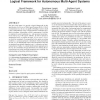916 search results - page 11 / 184 » Activity Theory for the Analysis and Design of Multi-agent S... |
CAEPIA
2003
Springer
14 years 2 months ago
2003
Springer
The development of software systems is a complex task that requires support techniques to guide the process and solve inconsistencies in its . In the agent paradigm, the use of soc...
INFFUS
2010
13 years 7 months ago
2010
This paper introduces design principles for modular Bayesian fusion systems which can (i) cope with large quantities of heterogeneous information and (ii) can adapt to changing co...
ACMDIS
2006
ACM
14 years 3 months ago
2006
ACM
Human-computer interaction research often includes a significant design component. In cases where software or other tools are developed and described, but no empirical evaluation ...
ATAL
2008
Springer
13 years 10 months ago
2008
Springer
The aim of this paper is to provide a logical framework for the specification of autonomous Multi-Agent Systems (MAS). A MAS is autonomous in so far as it is capable of binding (...
AOSE
2007
Springer
14 years 1 months ago
2007
Springer
Abstract. Nowadays, information systems have to perform in complex, heterogeneous environments, considering a variety of system users with different needs and preferences. Software...


